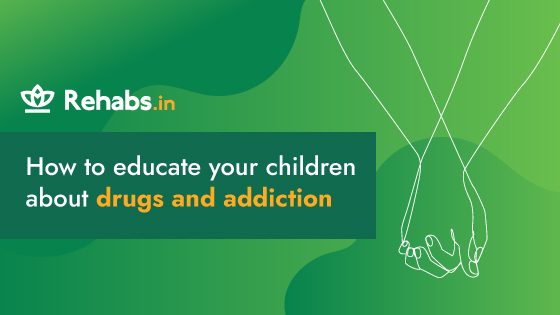How to educate your children about drugs and addiction

Children are precious and innocent, and we want to shield them from bad influences that they may come across in their lives. However, as they grow up, they will be exposed to many things, both good and bad. So, wouldn’t it be better if we start having conversations about things like cigarettes, alcohol, and drugs while they still look up to us for guidance?
A great outcome of starting these conversations at an early age is that you can create an environment that encourages open, honest dialogue and reduces the stigma around it. When your kids are faced with situations they are not sure of, then they can always come back to you for guidance.
Addiction among children is not unheard of. Drug addiction in children in India is especially rampant among street children. According to CHILDLINE 1098, a free emergency phone service for children in need of aid and assistance, heroin, opium, alcohol, cannabis, and propoxyphene are the five most common drugs being abused by children in India. Children affected by substance abuse are considered children in need of care and protection under the Juvenile Justice Act 2015.
Educating your children about substance abuse is not a one-time conversation. Throughout their young and sometimes even adult life, you may have to touch upon this topic from time to time. Hence, it could be great if you, too, keep yourself abreast about the latest drugs the kids are doing these days and how to keep your child away from them. Prevention of drug addiction at an early age begins with the right education.
Useful tips on educating your child about the ill effects of drugs and addiction
While there are many ways in which you can educate your child about drugs and their effects, here are some helpful tips:
Have an age-appropriate conversation: Your 2-year-old is unlikely to come across drugs like marijuana and cocaine, so maybe it may not make much sense to talk about these drugs. However, your child is likely to observe you taking your daily vitamins or antibiotics when you have a cold. You need to educate your child that only a doctor can prescribe these medicines, and they cannot take anybody else’s medicines. It’s important to not just keep these medicines away from children but to also teach them why they can’t have their parents’ medicines.
Look for a teaching moment: When your child sees a person smoking or drinking, either on television or in real life, take the opportunity to tell them the ill effects of smoking and consuming alcohol. Teach them how addiction can cause people to continue using these substances even when they know it’s bad for their health. It is also important to make them understand that addiction is bad and not the person who is addicted to it. Teach them not to judge a person as good or bad based on their addictions. A kind approach can go a long way.
Be clear about the rules: Addictions can come in many forms and are not limited to only drugs. Among teenagers and young children, screen addiction, social media addiction, and video game addiction are quite common. You could lay down the rules about how many hours in a day they can have access to their social media accounts and gadgets. Make them understand that trying to find validation in the online community isn’t healthy, as the expectations are unrealistic. Also, educate them on how they can get lured into cyber scams and crimes. Most importantly, they need to understand that there will be consequences to breaking your rules, for e.g., no screen time for a week.
Teach them to avoid peer pressure: Peer pressure can happen at every stage of life. However, children may feel the pressure even more as they still aren’t mature enough to understand the consequences of wrong actions. Teach them that a true friend would never force them to do something they are not comfortable with. Make them understand that they do not have to pretend to be someone else just to fit in. Most importantly, highlight the fact that doing drugs and alcohol is not cool.
Talk about the health consequences: The “why” behind the “don’t” is very important. If your child is old enough to understand these things, then take them to a few drug awareness programs. Make them read literature that talks about diseases like liver cirrhosis, lung cancer, and mental ailments caused by drug abuse. Most youngsters do care about their physical appearance, so without being too graphic, you can inform them how constant drug abuse can lead to loss of all teeth and falling hair, loss of muscle mass and, in some cases, gangrene and amputation of limbs. Do not scare them with these facts. Just relay it out in an educational manner.
Talk about the legal consequences: It can be a good thing to inform your teenage children of the legal consequences of consuming drugs. Inform them that under the Narcotics Drugs and Psychotropic Substance Act of 1985, it is illegal for a person to produce/manufacture/cultivate, possess, sell, purchase, transport, store, and/or consume any narcotic drug or psychotropic substance. The punishment can range from 6 months to rigorous imprisonment of 20 years, plus a hefty fine of up to 2 lakhs. Another important feature of the NDPS Act is Section 31A which prescribes the death penalty for repeated offences or certain rare cases.
When it comes to alcohol consumption, there is no legal penalty for underage drinking. However, actions taken under the influence of alcohol, like driving, or being a public nuisance, may invite some legal troubles.
Keep the conversation going: When it comes to your family and their welfare, it can be a good thing to have certain conversations ongoing. Drugs, alcohol, smoking, addictions, mental health issues, peer and societal pressure, and online influences; all these topics can take different forms and shapes as your child grows into adulthood. Hence, it’s advisable to keep the conversation going and let them know that you will always be their sounding board for guidance. Assure them that even if they falter, you will be there to help them heal and that your love for them will never waver.
In closing, talking to your children about alcohol, drugs, and addiction can be a bit difficult. However, with the above tips and some patience, you may be able to educate them in a loving and kind manner. It’s advisable to start these conversations at a young age because, at this age, they look up to you for guidance. Also, no matter how old your child is, it is never too late to create an environment of trust, openness, honesty, and security, so no matter what temptations they may face, they can always come back to you for your honest opinion.
Sources:
8 tips for talking to kids about drugs. https://www.healthparkpediatrics.com/
Shyam.A., Baviskar.P., Singh.Z. (2021, Nov) Indian laws relating to drugs and poisons
Child Drug Addiction In India
https://www.childlineindia.org/a/issues/addiction
Dasgupta.S. (2017, Nov) Substance abuse among street children in India. https://mediaindia.eu/















